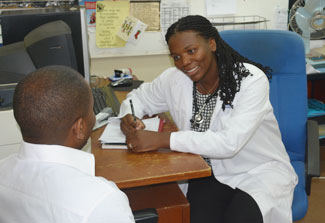Profile: Fogarty Fellow Dr Akwi Asombang advances cancer research in Zambia
November / December 2015 | Volume 14, Issue 6

Photo courtesy of Dr. Akwi Asombang
Dr. Akwi Asombang's fellowships on cancer risk factors in
Zambia solidified her interest in global health.
By Cathy Kristiansen
Dr. Akwi Asombang wondered about incorporating global health research into her career. While she was in the midst of a gastroenterology fellowship at Washington University School of Medicine, she decided to test the waters by applying for a Fogarty fellowship in Zambia. She was selected and embarked on an experience that would guide her future.
"It was absolutely amazing, it solidified my interest in global health and how I see myself," she said of fellowship, funded by Fogarty's Global Health Program for Fellows and Scholars, which provides yearlong mentored clinical research experience overseas for postdoctoral fellows and pre-doctoral scholars. The National Cancer Institute (NCI) also contributed support. She recalls, "I was able to see opportunities for research, the vast need for more data."
Her fellowship research project examined how antioxidants ward off cell-damaging oxidative stress, which is suspected as a cause of cancer. Fruits and vegetables are key sources of antioxidants. Asombang found although the typical Zambian diet is dominated by vegetables rather than animal products, additionally eating fruits year-round was protective against gastric cancer. Her study also clarified the accuracy of measuring urinary isoprostanes, which are generally accepted as the most reliable biomarker of oxidative stress.
Asombang is especially interested in the early occurrence of gastrointestinal cancers in the Zambian population. These are often undiagnosed or identified too late to treat effectively. The country has few gastroenterologists and lacks relevant data to guide treatment strategies and health policy. "I went there with the intention of looking at gastric cancer," she recalls. "But then I encountered esophageal cancer cases, so our team decided to pursue that as well. Along the way, I got more intricately involved with patient care, a welcome addition to my research portfolio. "Asombang has continued to study not only gastric cancer but also esophageal, colorectal and pancreatic cancers. She is now an assistant professor at the University of Missouri and returns periodically to Zambia to continue her research, having secured further grants after her fellowship. Based on networking done at that time, she has also been invited to lecture at a Zambian university.
Asombang recalls one eye-opening revelation during her fellowship - the difficulty of obtaining laboratory tests, which impacted both research and routine patient care. In the U.S., she was used to receiving laboratory results promptly, even within hours, but her work in Zambia required more hands-on involvement such as collecting blood and urine samples and delivering them to the respective labs. She noted, "Things we take for granted here - the availability of manpower, the limitless supply of the different equipment and tests we use - were not routinely available in Zambia."
She found it necessary to learn some new laboratory techniques, such as making dry ice for storing and transporting samples. She recalls, "We got a tank of carbon dioxide and attached it to a dry ice maker, then transferred it into a secure container. The room became cloudy and we laughed at the fun of it."
Aside from being surprised by a number of logistical challenges during her fellowship, Asombang found some emotional aspects difficult. She diagnosed a 19-year-old woman with colon cancer and, although she arranged for the best care possible, she heard the woman had died a year later. "I built such a bond with her," she remembers. "Her aunt, who used to bring her to the clinic, named her own daughter after me."
Asombang said she is now much more aware of the challenges in resource-limited settings and the great need for more research and clinical interventions. "Being on the ground helped me understand the burden of disease and opportunities for improvement in both patient care and clinic education," she noted. "I believe I am in a stronger position to continue to contribute to what is known about gastrointestinal cancers in Zambia and neighboring countries."
More Information
To view Adobe PDF files,
download current, free accessible plug-ins from Adobe's website.